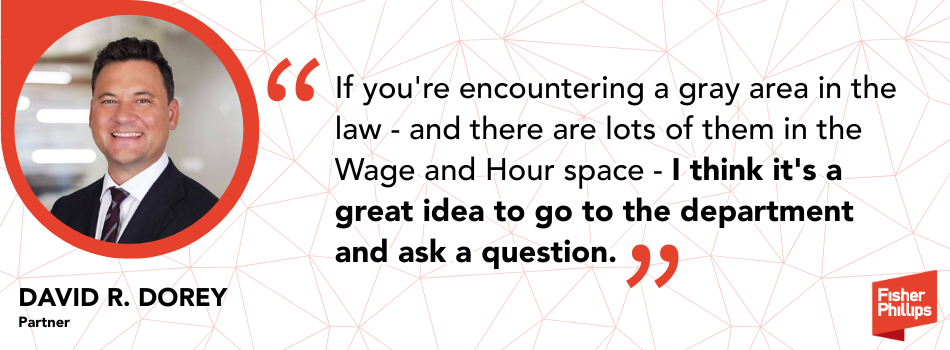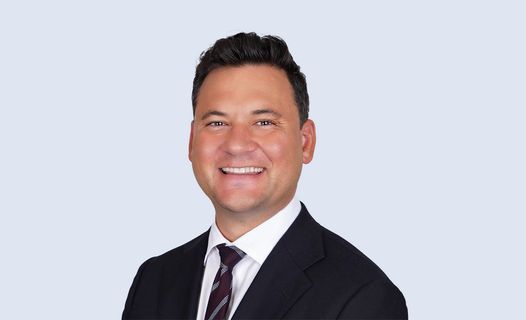The Senate’s recent confirmation of Andrew Rogers to head the Department of Labor’s Wage and Hour Division will press the gas pedal on Trump administration plans to clarify joint employer and independent contractor status, as well as several compliance assistance initiatives. As Rogers settles into his new role, employers should be aware of several key DOL programs and regulatory initiatives that he will be leading. Here’s what you should keep an eye on in the federal wage and hour space.
Quick Background
Rogers, whose nomination was approved by the Senate on October 7, has worked in the Wage and Hour Division before – experience that will allow him to quickly get his hands into several key rulemakings that will have major implications for employers.
“Rogers has been there before, so he knows the players, he knows the building. It’s going to be helpful to not have so much of a learning phase to start, but rather, he can hit the ground running from the get-go,” said Dave Dorey, a partner in Fisher Phillips’ DC office who was an appointee at the Department of Labor (DOL) in the first Trump Administration.
Multiple Rulemakings on the Horizon
The timing of Rogers’ confirmation, which came substantially earlier than Cheryl Stanton’s in the first Trump administration, also gives him more runway to tackle the Trump administration’s goals – which include cutting federal regulations and reducing compliance burdens on employers in an effort to spur economic growth.
The Wage and Hour Division has plans to issue rulemakings on independent contractor and joint employer status under the Fair Labor Standards Act (FLSA), according to DOL’s Spring 2025 Regulatory Agenda. Both changes could affect employer liability for subcontracting and franchise agreements.
The agency has also already proposed tweaks to minimum wage and overtime rules for certain in-home domestic service employees. If finalized, the rule would reestablish broader exemptions from minimum wage and overtime requirements for workers who provide companionship services, as well as an overtime exemption for domestic service employees who reside in the house in which they work.
With all that groundwork in progress, several major proposals may be “close to done,” according to Dorey. Rogers may “want to take a look at what's been put together with fresh eyes, see if he is happy with it, make changes as need be, and then send things over to OIRA,” Dorey said. “I would expect notices of proposed rulemakings relatively soon.”
Heavy Compliance Focus
DOL has made multiple changes to the Wage and Hour Division’s enforcement approach ahead of Rogers’ confirmation, broadening compliance assistance efforts launched during Trump’s first term. DOL resurrected its Payroll Audit Independent Determination (PAID) Program and expanded it to include Family and Medical Leave Act (FMLA) issues along with potential FLSA claims. And it announced that it will no longer seek or collect liquidated damages in administrative matters under the FLSA.
The PAID program allows employers to self-report their pay practices and correct potential minimum wage, overtime, or medical leave violations under a supervised settlement with DOL. The program can help businesses avoid a potential FLSA or FMLA lawsuit, but doesn’t shield employers from state law claims.
Opinion Letter Program
The agency also rolled out an expanded opinion letter program earlier this summer, which will likely churn out guidance at a faster pace with Rogers’ confirmation.
The initiative encourages employers to send in inquiries about how the agency would interpret the law in a specific situation. While the letters aren’t binding on the courts and apply to a specific set of facts, they can provide employers with a clearer direction about where the law stands and can be used as persuasive authority in defending against a legal claim.
Those efforts, and others, signal a push from the top to engage with the regulated community, according to Dorey.
"If you're encountering a gray area in the law – and there are lots of them in the Wage and Hour space – I think it's a great idea to go to the department and ask a question,” he said. “And I think what you're going to see is a really big appetite to tackle those questions, because they provide some level of certainty beyond where things are now about where the department might come out under a certain set of facts.”
Conclusion
The Fisher Phillips Wage and Hour Team, and particularly the Audit and Compliance Team, can help plan and conduct audits and guide you through responding to potential claims or government investigations. If you would like assistance with reviewing wage and hour compliance measures, or if you need assistance with a DOL audit, reach out to your Fisher Phillips attorney or any member of our Wage and Hour Practice Group. We will continue to monitor developments related to all aspects of workplace law. Make sure you are subscribed to Fisher Phillips’ Insight System to get the most up-to-date information directly to your inbox.




